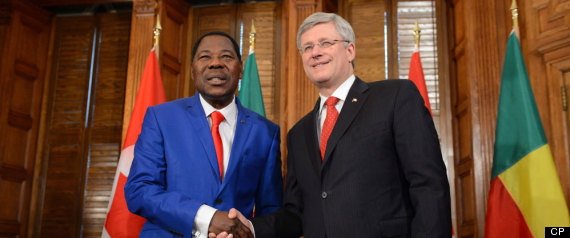 OTTAWA - Prime Minister Stephen Harper ruled out sending Canadian troops to fight Islamist insurgents in Mali, essentially rejecting an impassioned request Tuesday by the head of the African Union for NATO to join the battle.
OTTAWA - Prime Minister Stephen Harper ruled out sending Canadian troops to fight Islamist insurgents in Mali, essentially rejecting an impassioned request Tuesday by the head of the African Union for NATO to join the battle.Harper said Canada will not join the fight alongside African Union forces in Mali against an al-Qaida-linked group that controls the northern part of the country.
"The government of Canada is not considering a direct Canadian military mission," said Harper, standing next to the visiting head of the African Union, Thomas Boni Yayi.
Boni Yayi, also the president of Benin, called on NATO to do what it has already attempted in Afghanistan — fight the spread of terrorism.
"We need to react for the simple reason (that) not only does this issue go well beyond the scope of Africa, but also we must focus on the fact that the scourge of terrorism is an issue for the entire international community," Boni Yayi said after a private meeting in Harper's Parliament Hill office.
"We would like to call upon the contribution of other countries. If the prime minister leads the way, all I can do is express how grateful I am. I think that NATO should add its forces to our efforts so this could be a global mission."
Though the two leaders radiated a camaraderie, they clearly disagreed on the meaning of a pre-Christmas resolution by the United Nations Security Council on the deteriorating situation in the landlocked West African country, which appeared to be a stable democracy less than a year ago.
The Dec. 20 resolution urges member states to provide such things as military training, equipment, intelligence and logistics to reduce the threat in Mali.
"Not long before Christmas, the Security Council approved the concept of an African security force to deal with the Malian situation," Harper said.
"We are providing humanitarian aid to this region, which is important and we are consulting with, and working with, and will continue diplomatically with our allies in the west and obviously our friends in Africa on ways that we can be of assistance."
But Boni Yayi said the resolution represented a call to countries outside the African Union and the Economic Community of West African States, or ECOWAS.
"The prime minister also talked about the UN Security Council resolution," said Boni Yayi.
"Our understanding of that is that in reality when we talk about an international force, it is not only ECOWAS or the African Union. There are also other forces outside the African continent that could contribute, taking into account the seriousness of the situation and the resources that are required to implement this."
Boni Yayi said he wants to see NATO play a direct role in Mali alongside an African-led force authorized by the UN last month.
Harper agreed with Boni Yayi's assessment that the insurgents in Mali pose a threat to the entire world.
"Obviously, we are very concerned about the situation. The development of essentially an entire terrorist region in the middle of Africa is a grave concern to everybody in the international community."
By ruling out Canadian military involvement, Harper undercut Defence Minister Peter MacKay, who recently said Canada was examining military options, including the notion of helping train the African force.
MacKay was absent from an economic signing ceremony on Parliament Hill between Canada and Benin that took place before their two leaders' joint press conference.
Foreign Affairs Minister John Baird and International Co-operation Minister Julian Fantino were in attendance.
NDP foreign affairs critic Paul Dewar said the prime minister appeared to blow off Boni Yayi with a rhetorical "we'll stay in touch, see you later."
"It would appear the government, first of all, doesn't have a coherent position when it comes to support of UN peacekeeping," said Dewar.
"And secondly, it seems to be giving the cold shoulder when it comes to the 'ask' from the (African Union)."
Original Article
Source: huffington post
Author: Mike Blanchfield
No comments:
Post a Comment